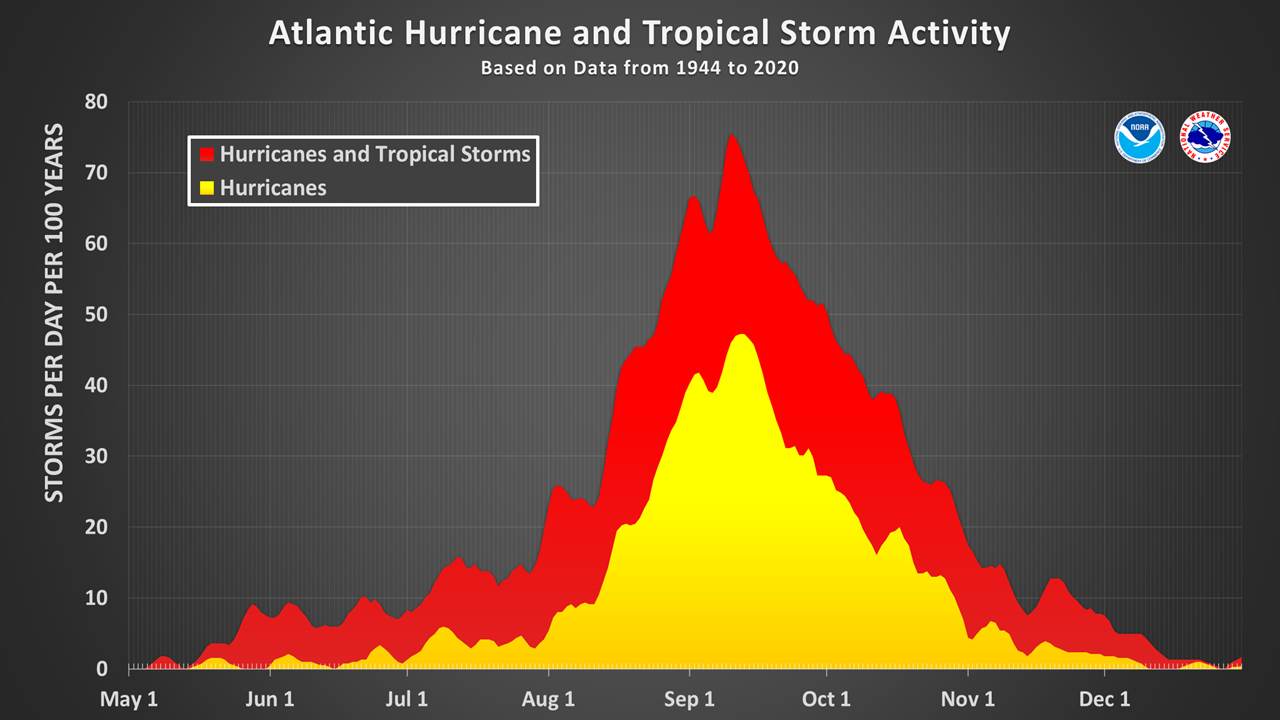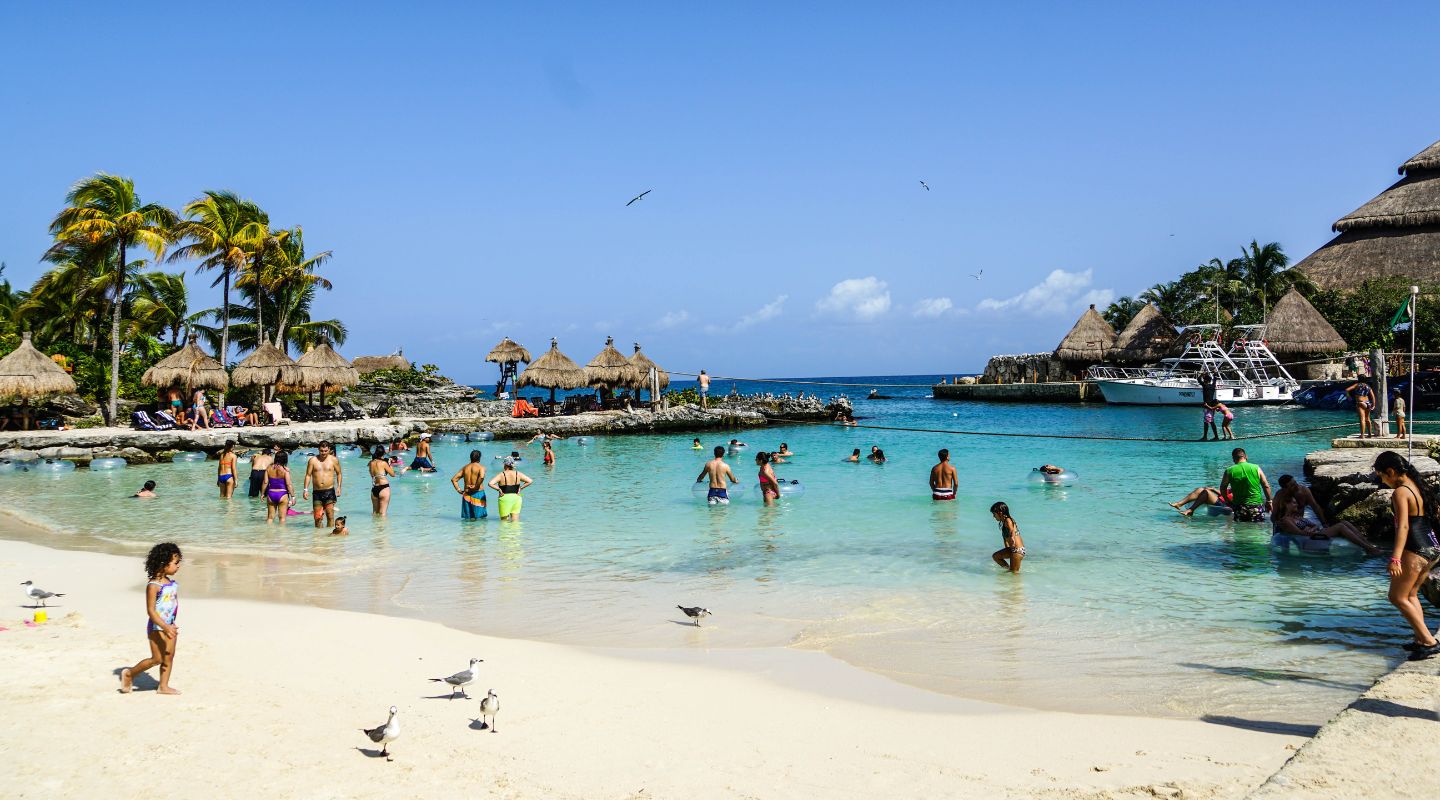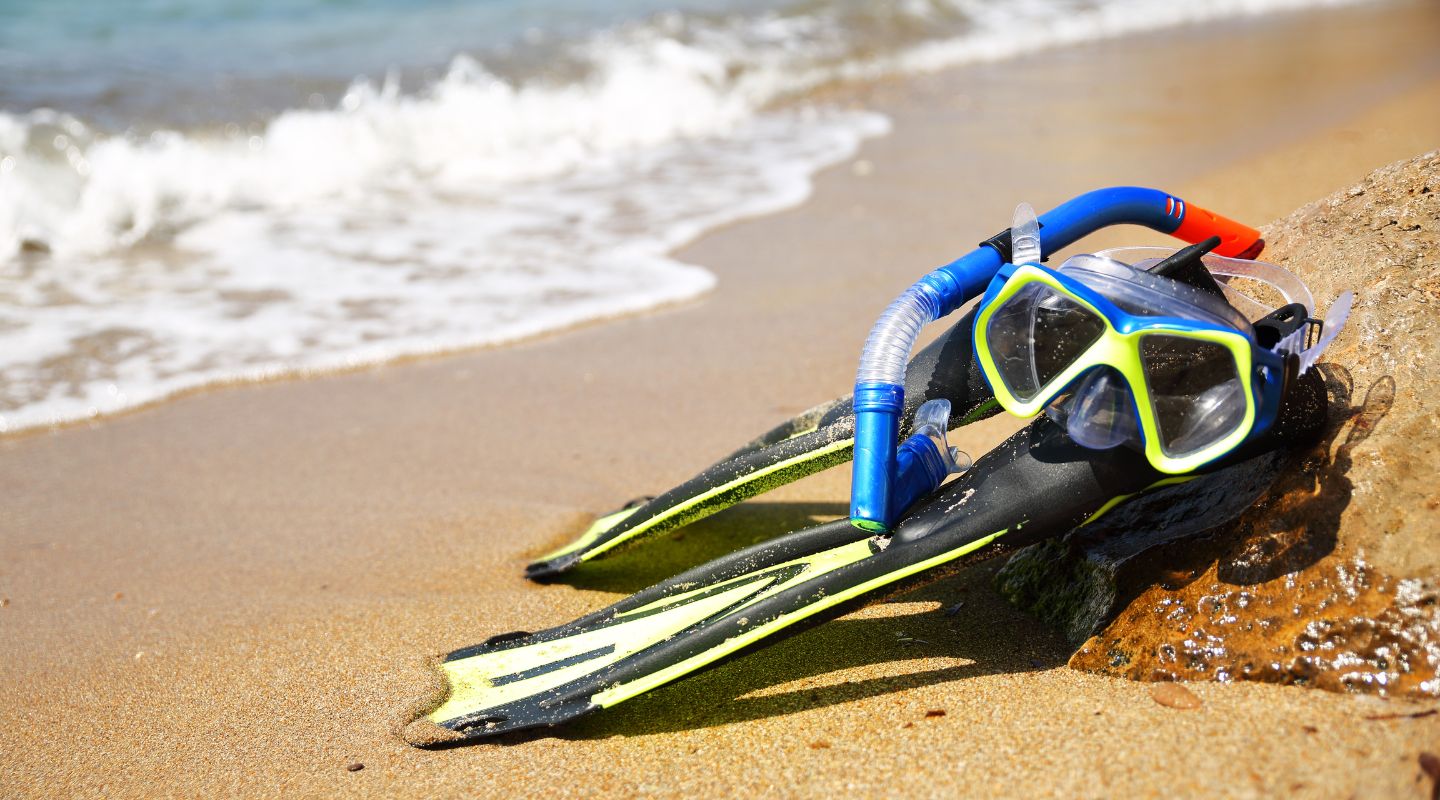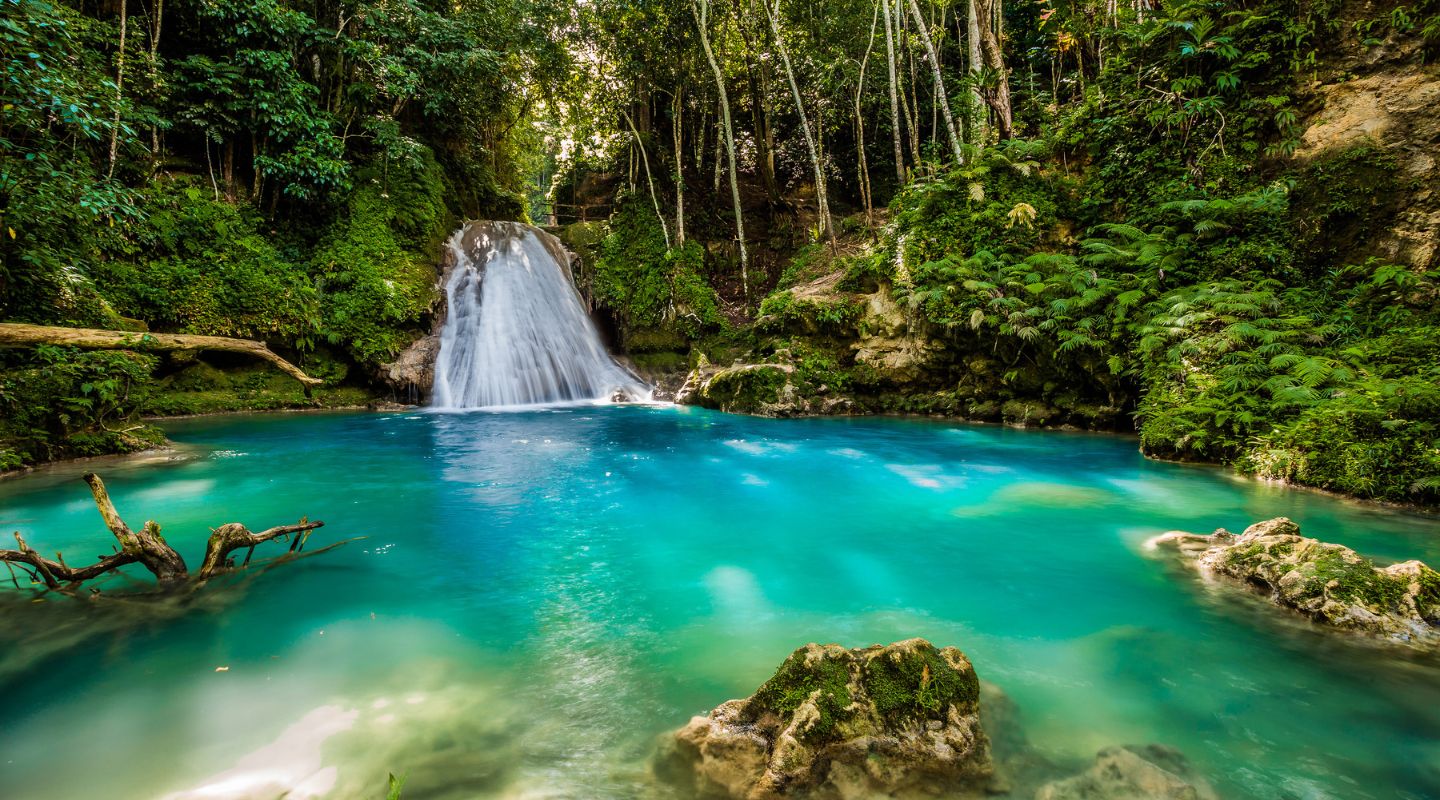Our Regional Expert's Guide to Caribbean Weather
Jump to: Hurricane Season in the Caribbean • January • February • March • April • May • June • July • August • September • October • November • December •
The Caribbean is known for its stunning beaches, friendly locals, and exciting mix of cultures. However, the weather in the Caribbean can be unpredictable, and it is important to be prepared for all possible conditions. Don’t get caught out with too much sunscreen when you really should have brought along that umbrella!
Here is a guide to Caribbean weather, so you can be sure to enjoy your time in the sun with minimal fuss about the weather. From the typical seaonal weather to a month-by-month breakdown. Also, learn what to expect over hurricane season. This guide can help you narrow down your decision on when to go and what to do while you’re there.
Typical Weather in the Caribbean

The Caribbean is a region that includes the Caribbean Sea, its islands, and the surrounding coasts. Popular Caribbean destinations include The Bahamas and Virgin Islands, the Caribbean coast of central america (i.e. Belize, Cancun, etc), large famous islands like the Dominican Republic, Cuba and Jamaica. There are also many smaller island destinations like the Bay Islands of Roatan, Cozumel etc.) or Turks and Caicos. For such a wide region that encompasses many different countries and cultures, the weather is surprisingly similar throughout.
Two Main Seasons
The Caribbean has a tropical climate, which means that it is warm and humid year-round, with an average temperature of around 80°F. However, there are two main seasons in the Caribbean: the wet season and the dry season. The wet season is characterized by higher humidity and more rainfall and runs from May to November. The dry season is generally drier and cooler and runs from December to April.
The seasons can differ slightly depending on the country. For example, Belize’s wet season stretches from June to December, while the Cayman Islands’ much shorter wet season is from mid-May to October. Some destinations (including Cancun, Dominican Republic, and St. Maarten) also get an additional mini-wet season in May, which experiences higher rainfall than April or June.
Looking for the lowest chance of getting rained in? Aruba is known as one of the sunniest islands in the Caribbean and historically receives a very low amount of rain. It sees, on average, 29 days of precipitation each year, a total of 7.1 inches of rain, and an extended dry season from January to August.
When is Hurricane Season in the Caribbean?

The Caribbean is no stranger to hurricanes. In fact, the region is one of the most hurricane-prone areas in the world. The official hurricane season in the Caribbean runs from June 1st to November 30th, with the peak months being August, September, and October. This is when the ocean temperatures are at their warmest, and the conditions are most favorable for storms to form.
The most important thing to remember when traveling to the Caribbean during hurricane season is to be aware and prepared. On average, around nine tropical storms form each year, but only five reach hurricane strength. It doesn't mean that the Caribbean is always hit hard when one does pop up. In fact, most years see only a few hurricanes making landfall.
Chances are, you won’t have any issues, but if you’re planning to travel to the Caribbean during this time, it is important to be aware of the potential for severe weather and to have a plan in place in case of an emergency. Follow the National Hurricane Center for updates and learn about the hurricane risk for your chosen destination.  NOAA
NOAA
If you’re planning a Caribbean getaway during the hurricane season, there’s a way to avoid the risk altogether. Many of the southern Caribbean islands sit outside the hurricane belt, the region where hurricanes are most likely to form. These include Aruba, Bonaire, Curacao, and Trinidad and Tobago.
Caribbean Weather in January
The Caribbean is a region that experiences tropical weather year-round, and January is no exception. Temperatures remain warm and humid throughout the month, with an average temperature in the mid to low 80s. For the warmest temperatures, the farthest south, the better.
Rainfall is moderate for most destinations, but for the best weather, stick to the western and southern Caribbean islands. The average rainfall here is about two to three inches of rain in January, so the odds of a good day are higher.
Caribbean Weather in February

February is one of the busiest months for tourism in the Caribbean, so it's no surprise that the weather is a big factor in planning your trip. The good news is that the weather in February is usually quite wonderfull across the Caribbean. The average temperatures in the Caribbean in February are in the low to mid-80s, with highs in the upper 80s.
The water temperature is at its coolest for the year this month, mostly in the low to mid-80s. There can be some variation from island to island and from one side of an island to the other, depending on which way the wind is blowing.
It can be too cool to swim for some visitors, so consider including more land-based activities in your travel plans. The cooler temps make February the perfect time for a day exploring the wide-open spaces of Chichen Itza near Cancun or an ATV tour through the rugged terrain of Jamaica's countryside.
Caribbean Weather in March
March still falls well and truly within the dry season, so visitors can expect mostly sunny skies and little rainfall. Temperatures during this time of year usually range from the low to mid-80s, and high temperatures tend to peak in the early to mid-afternoon.
The average evening temperatures range in the low to mid-70s and sometimes go even lower, so it's still worth bringing along an extra layer to wear when heading out at night. The water temperature starts getting warmer in the north, making snorkeling and diving activities much more comfortable.
There is usually very little rainfall in the Caribbean in March, with an average rainfall in many destinations of only a few inches. Some of the driest destinations in March are Aruba, Costa Rica, and Montego Bay.
Caribbean Weather in April
April is the last month of the dry season in much of the Caribbean so rainfall is the lowest it will be for the rest of the year. This makes it an ideal time to enjoy the outdoor activities and adventure parks that the region has to offer.
Temperatures in the Caribbean during April are usually warm, with an average high of around 86°F. However, it is not unusual for the temperature to reach into the low 90s in some areas. The water temperature is also warm at this time of year, typically around 80°F, which makes it just right for swimming and enjoying the water.
April is one of the best times to visit the Caribbean if you are looking for warm (but not scorching) weather combined with relatively dry conditions. Personally, it’s my favorite time to visit. It’s often a shoulder season in much of the Caribbean which means you’re likely to avoid sharing all your fun with hordes of other tourists.

Caribbean Weather in May
May is considered the start of the wet season in much of the Caribbean, with rainfall and humidity levels increasing throughout the month. The average high temperature in May is in the high 80s to low 90s and the Northern Caribbean is catching up with the temperatures found in the lower half, so anywhere you pick will be great for some sun, sand, and sea adventures.
The increased rainfall and humidity levels can put off many tourists, which makes May another shoulder season. If you’re willing to take the risk of a couple extra days of rain, then you might be in luck. The weather is usually warm and sunny, with only occasional showers. The decrease in tourists means the roads will be emptier as well, so consider booking a biking excursion like Jamaica’s popular Blue Mountain Bicycle Tour.
Caribbean Weather in June

June 1 marks the official beginning of the hurricane season, but the good news is,that the strongest time for hurricane activity doesn’t occur until August. What you will have to contend with, however, is an increase in the temperature.
Temperatures during summer usually sit in the high 80s during the day and 70 - 80°F at night, especially near the coast. The ocean air keeps the summer temperatures from getting too hot, so if you’re not accustomed to Caribbean weather in the summer, it’s a good idea to stick to the coastal regions. An increase in rainfall this month should help cool things down as well. You can usually expect short, sharp showers followed by a return of the sunshine.
The Caribbean Sea temperature reaches its peak from June onwards as well, with averages of 81 to 82°F. Book a snorkeling tour to really make the most of the great weather.
Caribbean Weather in July
Rainfall increases this month in most of the Caribbean, but prices also drop. If you're willing to risk the chances of some tropical showers during your holiday, you could be in for a bargain vacation with much fewer tourists.
July is considered part of the hurricane season, but not quite at its peak yet, so you can get out to explore the islands while enjoying the lush, green vegetation brought on by the rain. This is a great time for a waterfall excursion when the rivers are full but not yet too full to be a washout.
Average high temperatures now start to reach or go above 90°F for many destinations around the Caribbean. If you’re looking for a cooler escape, consider Belize, Costa Rica, or Montego Bay.

Caribbean Weather in August
August continues the hot, hot summer theme and is still a warm, humid month in the Caribbean with average temperatures in the high 80s/early 90s. It’s a great time for a beach vacation and swimming and snorkeling should definitely be on the agenda.
From mid-August into the next couple of months you’ll be visiting during the peak of the hurricane season so it’s important to have a Plan B in case one does pop up. If you’re spontaneous and don’t mind booking something last-minute, August could be a winner to save on hotels, cruises, and excursions. Plus, it’s a great time to experience the region's many festivals and cultural events.
Caribbean Weather in September
September is a month when the weather is still warm but not as hot as it is in the summer months. The temperature is perfect for spending time on the beach or exploring the many islands.
Two things to be aware of this month are heavier rainfall and hurricanes. Most Caribbean destinations will experience their highest amount of rainfall either this month or next, and some places, like St Lucia, will have more rainy days than sunny ones. Hurricanes are also possible, so you’ll have to be a bit more flexible with your travel planning. Pick a more cultural activity, like a museum visit or cooking class, to keep you dry indoors.
Caribbean Weather in October

October is generally a month of transition in the Caribbean, as the weather starts to cool down from the hot summer months.
In October, average temperatures in the Caribbean range from the low 80s to the mid 90s. The cooler temperatures are found in the northern parts of the region, while the southern and eastern parts tend to be a bit warmer. October is also a month of relatively high humidity as the region experiences the tail end of the hurricane season.
Rainfall varies throughout the Caribbean in October. The northern and western parts of the region tend to be drier, while the southern and eastern parts experience more rainfall.
October is another peak month for hurricanes in the Caribbean. While chances are still not very high, if you’re conscious about a storm ruining your holiday, book a Southern Caribbean cruise or fly into one of the southern islands like Aruba, Bonaire, and Curacao.
Caribbean Weather in November
November can be considered a shoulder season for many Caribbean destinations. Some are now in the dry season, and others will have a significant reduction in the amount of rainfall. November is the last official month of the hurricane season, but your chances of encountering one are much lower than in previous months.
Temperatures drop to the mid to upper 80s for most destinations, but the evenings can be a bit cooler, so it's worth packing a light jacket or cardigan for the evenings.
Caribbean Weather in December
December’s Caribbean weather is usually warm and sunny, with occasional showers. The average temperature is in the mid-80s for most islands and the mainland. Nighttime lows can drop into the low 70s, so make sure to pack some warmer layers for evening activities. Some destinations might even get too cool for swimming so you’ll want to carefully plan where you go if you’re sensitive to the cold.
Overall, December is a great time to visit the Caribbean, as the weather is perfect for spending time on the beach or exploring the islands. If you can time your visit between early to mid-December, you’ll be able to take advantage of the near-perfect weather before the crowds descend for the holidays.
Data from: Weather Spark
All of our content at Caribbean Tourbase is written by experienced travel writers who have visited all of the locations we recommend. And our review board of local tourism experts ensure that all the information we provide is accurate, current and helpful
